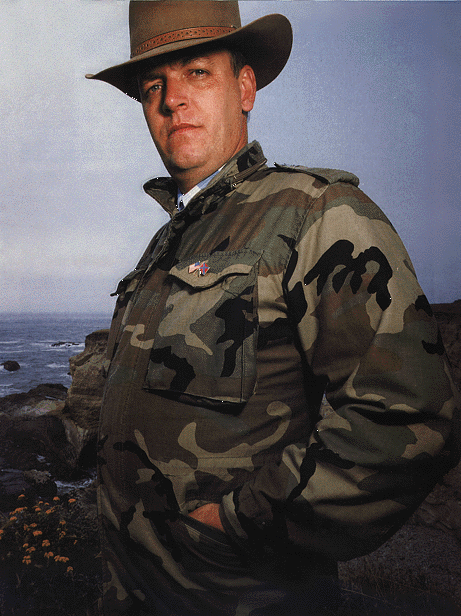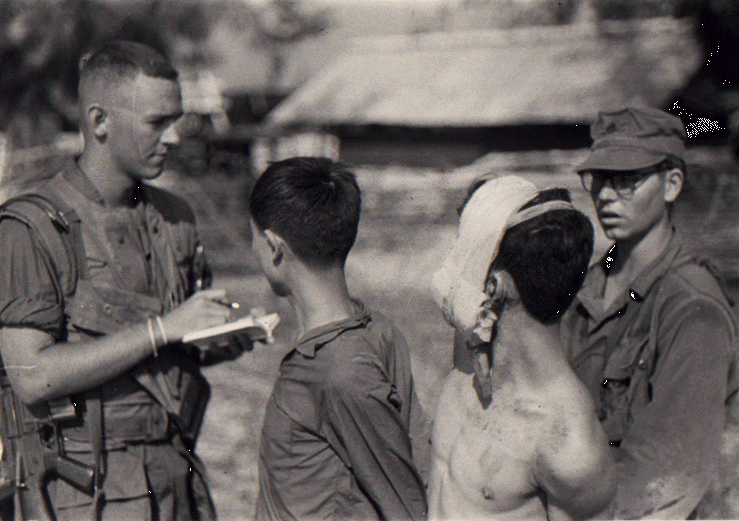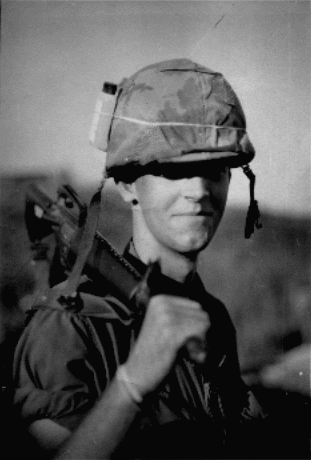
Grover Lewis was part of a remarkable generation of Texas writers to emerge onto the national scene in the 1960s and ‘70s, including Larry McMurtry, Larry L. King, Edwin “Bud” Shrake, Gary Cartwright, Billy Lee Brammer, Dan Jenkins, and Dave Hickey. Police records show that Lewis’ estranged parents shot and killed each other in San Antonio when he was a small child, and he was raised among uneducated and poor relatives who, for the most part, discouraged him intellectually and artistically. He also was legally blind, making his way as best he could through substandard Texas public schools. Yet, remarkably, he managed to become very well read and developed an encyclopedic knowledge of American film. At what’s now the University of North Texas, he fell in with the company of other bright students with a literary bent, including McMurtry. He then pursued graduate school and newspaper work for several years.
Among Texas newspaper reporters, he developed a reputation as a hard-drinking, never-back-down journalist. He made a name for himself nationally when he began to publish articles in the Village Voice in the late 1960s. He then became an early staff writer and editor for Rolling Stone, where he proved to be a master of long-form journalism. At the time, Rolling Stone was at its peak of its journalistic influence and Lewis was one its star contributors. While he wrote about a variety of topics, his groundbreaking work was made up of dispatches from the shooting locations of some of the most important films of the 1970s.
Lewis’ tenure at Rolling Stone was relatively short-lived, however, as conflicts with publisher Jann Wenner grew. After leaving Rolling Stone, he contributed to several magazines, notably New West and Texas Monthly. Except for paperback collections of his Rolling Stone articles and poetry, he published no books, yet he developed a devoted cult following for his magazine pieces, a following that included important authors, editors, critics, and filmmakers. A heavy smoker, Lewis died of lung cancer in April 1995 at age 61. Ten years later, the University of Texas Press published Splendor in the Short Grass: A Grover Lewis Reader to wide acclaim.
—W.K. (Kip) Stratton is the co-editor of Splendor In the Short Grass.
“The Killing of Gus Hasford”
By Grover Lewis
1. SEMPER GUS
“The best work of fiction about the Vietnam War,” Newsweek called Gus Hasford’s The Short-Timers when it was first published in 1979. The slim hardcover sold, like most first novels, in the low thousands, but established its author as one of the premier writing talents of his generation. In the tradition of Stephen Crane, Hemingway and James Jones, the book summoned up the horrors of war in an unrelenting voice with all the potential for world-class success.
Hasford’s critical stock rose even higher when Stanley Kubrick filmed the book as Full Metal Jacket. Released in 1987, the picture received one major Academy Award nomination—shared by Kubrick, Michael Herr and Hasford himself for best screen adaptation. At a stroke, the struggling, rootless young novelist entered the upper realms of “A-list” Hollywood. But in a skein of envy, spite and the inexorable grinding of bureaucratic “justice”—all of them compounded by Hasford’s own obsessive passion for books—his newfound celebrity backfired, and he was sent to jail on bizarrely exaggerated charges involving stolen and overdue library books.
It all combined to kill him.
Gus died alone, as he had mostly lived, in Greece on January 29 at the measly age of 45 from the complications of untreated diabetes. His death coincided eerily with the 25th anniversary of the Tet offensive, the campaign so graphically described in The Short-Timers. Two weeks after the shock of his death, 20-odd mourners had gathered in the chapel at Tacoma’s Mountain View Memorial Park. Gus’ kin sat close to the front—his mother, Hazel, a gaunt and visibly ailing Alabama native, along with Gus’ younger brother, Army Sergeant Terry Hasford, and Terry’s Korean wife, Soo. Back of them a couple of rows were the Snuffies, a cadre of Gus’ brothers-in-arms from the Vietnam days, all wearing their battle ribbons on sweaters or lapels, the five men who’d managed to attend representing a total of eight Purple Hearts.

Several editions of The Short-Timers lay on Gus’ bier, along with copies of his later books, The Phantom Blooper and A Gypsy Good Time. Gus’ picture as a stern-faced teenage Marine sat on a pedestal, The urn containing his ashes on another. His Vietnam decorations were also on display—two rows of ribbons plus-one, the highest being the Navy Achievement Medal with a Combat “V.”
Five wreaths ringed the dais—two from Gus’ family, another from “Doctor Dave” Walker, who’d been Gus’ landlord and unofficial medical adviser in his last days in America. A spray of white tulips was signed, “From all the gang down at the Cafe Cafard.” The floral tribute from the 1st MarDiv ISO Snuffies spelled out SEMPER GUS. Nothing from Hollywood—not a bud or sprig from Stanley or Michael or any of the other distant A-listers who’d profited from The Short-Timers.
Assorted friends sat across the aisle—Doctor Dave, and the book dealer Bruce Miller from San Luis Obispo, who’d supported Gus during his trial, and Kent Anderson, another formidable Vietnam War novelist. Anderson, author of Sympathy for the Devil, fidgeted in agitation. I sat just behind him, shivering a little in my lightweight L.A. clothes, In the far rear of the room, with their rifles stacked out of sight, sat six young Marines in full dress uniform, white hats squared on their blue-clad knees.
The noon ceremony was spare, simple and elegantly offbeat Steve “Bernie” Berntson, chief archivist of the Snuffies, spoke a brief eulogy and then set out bottles of Jack Daniel’s, fruit juice, Evian water and California wine. Nine other mourners, including myself, offered personal tributes to Gus, concluding with toasts to his memory. A local Presbyterian minister, a little nonplussed by the procedure, toasted God.
At the service’s conclusion, the Marine honor guard fired four volleys of salute outside the chapel, followed by a bugler playing taps. A smart-stepping Marine SNCO presented Gus’ mother with a folded American flag. “In behalf of a grateful nation, ma’am, we present this flag as a token of your son’s honorable and faithful service to the United States of America.” Mrs. Hasford sat with her eyes lowered, softly fingering the cloth. “I never could understand that boy,” she’d told one of the Snuffies a few days before, “just never could.”
In a caravan of cars, the memorial moved en masse to Berntson’s house in a nearby suburb, where the post-mortems continued through the afternoon and into the evening in a glow of sipping whiskey, fond remembrance and brusque camaraderie. Many of the characters in The Short-Timers had been modeled on the now-middle-aged Snuffies, and the men were strapping proud of the distinction. In Vietnam with Gus, they’d all been Marine combat correspondents, equally adept filing dispatches or fighting hooch-to-hooch. At Gus’ wake, circulating from bar to buffet. they openly discussed his jail sentence and its effect on him. None of them approved of his transgressions, but none of them had rejected him, either. As men who’d shared life at its worst, they viewed Gus as family—and whatever had happened, they loved him. “Capital punishment for library violations?” Gordon Fowler growled. Gordon was “Cowboy” in the book.

Bernie told perhaps the best “Gus story”: “It’s peculiar, but this happened exactly 25 years ago today. I’d set up a base camp in Hue City, and Walter Cronkite rolls up with a camera crew. He was doing a stand-upper with some pogue colonel, asking about rumors that our guys had looting. Just then Gus busts in with two black onyx panthers and a stone Buddha on his back. ‘Hey, there’s a whole temple full of this shit,’ he hollers.’ We can get beaucoup bucks for this stuff in Saigon!’ I hustled him outside quick, and Cronkite, of course, came back home and declared the war unwinnable on national TV.”
There were a million Gus stories, and some of the classic ones were told by Major Mawk Arnold, USMC (Ret.). He arrived late in the afternoon, delayed transit, but he was essential not only for his moral presence, but to carry Gus’ remains back to the Hasford family plot in Haleyville, Alabama. Picture John Huston with a shiny pate, resplendent in dress blues and battle ribbons dating back to the South Pacific and China in the 1940s. “Skipper” Arnold had created the Snuffy team by letting them make their own mistakes and victories. Nearing 70 now, he’d been the catalyst—the force who’d molded raw young snuffy recruits with reading habits and verbal skills into warrior artists in a World of Shit.
Another round of toasts commenced after dinner. Every Snuffy present had helped Gus out of various hapless jams during and ever since the war … and, Jesus, if the fucker hadn’t slipped out of their reach, maybe he wouldn’t have died. It hung over the table, unspoken. Bob Bayer (“Mr. Short-Round”) recalled driving hundreds of miles to rescue Gus from his latest broken-down lemon car. “He could start out to meet you with a thousand bucks in his pocket, walk past a bookstore, and then you’d have to spring for dinner.” Earl Gerheim (“Crazy Earl”) nodded and smiled: “Gus had a 45-year childhood—the childhood the rest of us missed, I guess.” There was general agreement that Gus had been a zany, wonderful, generous naive, impractical genius, maybe too pure in his way to die of old age. Bernie raised his wine glass. “To those of us who are near,” he said, “and those far away, and those who are beyond the wire.”

Around midnight, since we both had early flights to catch, Skipper Arnold offered me a lift. We rode across the dark city, at conversing in low tones, with Gus’ ashes in the trunk.
Back at the hotel, I packed for a wake-up call, turning over in my mind again the riddle of how Gus had become a victim instead of a victor. As much as anybody—except perhaps Gus himself—I understood how he’d been stung to death by success. But there was one more key to turn, one final labyrinth to enter—in a hilly suburb of San Diego. For the first time in two weeks, I fell into deep, dreamless sleep.
2. CAFARD
“I know this psycho vet novelist you ought to meet,” Judith Coburn, a writer for The Village Voice, told me over drinks in the spring of 1982. Coburn, one of a handful of American women to cover the Vietnam War, let me know with a look and a shrug that she’d gone out with Gus Hasford a time or two and found him too much of a headache. “Maybe !’ll bring him by.” I said sure, lovely. I’d admired Hasford’s book and was curious to meet him I figured anyone who wrote with that kind of crafted velocity would have to be a piece of work.
When the two of them arrived on the weekend, July was fuming. On the walk over. they’d argued in shouts about the IRA, wi1h Gus staunchly defending terrorism. She !eft early and he ended up staying late.
In his early 30s then, a tall, beefy lad in mismatched wash-and-wear clothes, Gus shook hands formally with my wife, Rae, and me, declined a glass for his beer, and launched into a stream-of-consciousness commentary that ranged from Nathan Redford Forrest’s cavalry tactics to Lion paperbacks, cheerfully finding a thread of comedy in everything, including Judy’s desertion. He had a huge, open, frequent country laugh, and he paced back and forth with big arms swinging. his eyeglasses and high forehead glinting, he seemed very much like a large child coming on as a swaggering Marine drill instructor. Amiable and eager to please, he was a ceaseless note-taker. If you said something be liked, he jotted it down immediately in the little leather-bound notebook he always carried with him. ‘”Hey, do you mind? I don’t want to make any more faux passes, y’know.”
With the ice broken, Gus raided the fridge for another beer, located the bathroom, and then took up position by the main bookcase in the living room, where he delivered a blistering diatribe against Harper & Row, from whose clutches he’d been trying for months to pry remainders of “Shorty,” as he called his book. “Hell, I don’t work for those candy-ass pogues,” he snorted, “they work for me.” In style, he was a master of bombast, invective and insult repartee—but his heart belonged to books. He spread his arms and said he owned over 10,000 volumes. “My God, where do you keep them?” “In a rental locker up in San Luis Obispo. It’s my research library.”

He clucked approvingly at my collection of hard-boiled titles, and pulled out a volume of Ambrose Bierce’s short stories. He read aloud a favorite passage from “Chickamauga” and said he was planning to write a biography of Bierce, plus a multivolume saga on the Civil War. Plus a novel about an American woman president, which he was presently working on. Plus a sequel to “Shorty” called The Phantom Blooper. Plus a series of six L.A. private-eye novels. His notebook was color indexed to various ongoing research projects, including Mark Twain, anarchy, the Alamo, Van Gogh, screenwriting and Abraham Lincoln—all subjects about which he expected to write books eventually. “I don’t quite have my stroke down on Hollywood yet,” he confided, “but somebody’ll film ‘Shorty’ one of these days, and I want to work on the script. My book, my movie. So maybe you’ll play me some videotapes sometimes and give me your counsel and talk to me and stuff. Hey, are we bonding yet?”
If Gus was chasing rainbows, it was on a Renaissance scale. He laid out his writing plans with such implacable certainty that you had to nod. He never quite let himself brag, but he had his path to success all mapped out, and he managed to leave the impression that he was poised for little short of world literary domination.
As a journalist, I specialized in playing fly on the wall to star misfits, and I recognized an utter original as Gus offhandedly related the bare bones of his back story. When he was a high-school kid in backwoods Alabama, he’d somehow managed to publish a nationally distributed magazine for writers called Freelance. Then, at 18, he’d joined the Marines to get away from Dixie and Mama. After the war, he’d floated through a decade of shit jobs up and down the West Coast while he honed The Short-Timers to a fine and polished point. Now, he was trying to get the bread together for a look-see trip to Australia with an idea of settling there permanently. He rejected American Civ wholesale—except for maybe Sizzlers and used-book stores. Full of outrageous opinions, he loathed “the brass” in all forms, whether military or industrial. At the moment he was flirting with anarchy, because it figured in his woman-president book, and I just laughed when he brought up the IRA as misunderstood heroes. When he got too far out for me to follow, that was my response, and usually he’d laugh, too.

Our conversation carried on into the night, and something subtle and intensely personal began to flow between us, keyed to the fact that we’d both grown up poor in the cracker South. Beneath his mock-macho manner, Gus projected unspoken miseries, unvoiced suffering—an undertone of vulnerability and isolation that he carried like a shadow. We compared notes on growing up, and I observed that neither of us had been properly raised—we’d escaped. Gus wrote it down. I began to feel protective toward him even as I laughed at his one-liners.
Still prowling our bookshelves, Gus came across Rae’s inscribed copy of Slouching Towards Bethlehem. “Ooh,” he crowed, “do ‘y’all know the Didions and the Dunnes? Could we go over there right now? I got a thang for Joan. I want her to sit on mah face!” Elaborating his fantasy in obscene flights, Gus picked up his empties and pitched in to help with the dishes.
Rae, who’d seen Hunter Thompson puke on his shoes and survived, said after Hasford had gone, “Sweet guy. We’ll have to get him some clothes.” We agreed he was a heartbreaker. Before turning in, I made a few notes of my own, sensing that Gus was going to be part of our history, not so much as a subject but as someone who taxed my abilities to sum him up.
Gus had an uncanny way of involving you in fun that was clever and layered and kept unfolding. On his third or fourth visit, he marched out to our glassed-in lanai, switched on the neon cerveza signs, and stood silently regarding the white buildings of downtown Santa Monica just as dusk fell.
“Through those palm leaves,” he announced, “it looks just like Saigon. Outstanding! I’m naming this joint the Cafe Cafard. Do you mind?”

Cafard, he said, Was an obscure French term meaning “beyond anomie or dread” that he associated with the last-ditch warriors of Dien Bien Phu. Gus appointed himself social director, and within weeks a company of regulars formed for occasional al fresco dining and light carousal. Gus brought in Andy Dowdy, the owner of Other Times Books in West L.A., and Dowdy in turn introduced us to Philippe Garnier, a correspondent for Liberation in Paris, and his wife, Liz Stromme. It was a cozy, harmonious circle, free of competition or back-biting—a sort of R&R club for non-joiners. If you weren’t happy to be there, you weren’t invited twice. Gus hungered for acceptance, validation of his talent, and the group gave him that.
Going out in public with him was a dicier matter. He would race into a software store and say to the first clerk, “Tell me all about computers.” He’d get buzzed off, of course, without ever fully understanding why. He and I went to only one movie together—after which I slunk out guiltily because he’d talked throughout the picture. At an exhibit of Larry Clark photos, he somehow grossed out the gallery attendant. As time went on, I mainly confined my travels with him to book-buying expeditions. In bookstores, he was as well-behaved as he ever got.
As a hardcore eccentric, Gus either charmed people on the spot or scared them off quick. Full of an astonishing array of tics, tropisms, quirks and peculiar habits, he was alarmingly innocent about some things and deeply cynical about others. Everybody found him unreliable about time and totally resistant to sane advice. He imagined he was being subtle when he was being obvious. Given one of his periodic fixed ideas, you had to jolly him along toward a ray of reason. Part of him was a sunny boy and another part was permanently angry—over his childhood, the war, his poor luck with women.
Gus’ love life was a touchy issue. Oh, he could score, I gathered, but he wanted to capture some worthy woman’s heart on a permanent basis. He had his career all plotted out, but he longed for a partner to ease his loneliness. In the past, he’d been briefly married, and was bitterly estranged from his latest girlfriend in San Luis Obispo. “Brains is what I’m looking for,” he joked, “but I’ll settle for big tits.”

Our first heated words arose over Gus’ free ways with library books. In describing his reference files, he let it drop that he sometimes checked out books without returning them or otherwise “liberated” items he needed. It hit me dead wrong—my own life had literally been saved by public libraries in Texas—and I jumped down his throat about it, pointing out the obvious fact that library books belonged to everybody.
“Well,” he said defensively, “I need them more than everybody. If the libraries would just let me, I’d buy the stuff outright. Cut me a huss, willya?” If Gus got really sore, the cranky child would come out in him and he’d stalk off with his hands clenched. Not knowing the extent of his “borrowings” and mildly rattled by my own moralizing, I marked it up to one more mad-cap quirk. You had to make allowances for such a wild hair.
When we’d first met, Hasford had been living in his car “between motels”—a fact he didn’t mention until his fortunes improved. That occurred when a Munich businessman with no visible ties to the movie world optioned the screen rights to The Short-Timers—acting, as it turned out, for Stanley Kubrick. Gus broke the good news by brandishing a one-way Qantas ticket to Australia. All of us were jubilant at his prospects, since he stood to make handsome royalties from his worldwide literary rights alone, not to mention the prestige that would come from Kubrick’s involvement. At a bon voyage party, Hasford grandly signed and passed out remainders of “Shorty” to one and all. As the evening wound down, I commented that it might be tough for him to find a spot in Kubrick’s plans. Gus grinned: “Hey, I’m a self-motivated individual.” “Well, I’ll spread your fame,” I said. “Okay, I’ll keep you posted,” he promised.
His first letter to us was dated November 23, 1982—from Perth, on Australia’s far western shore:
I am, as we say so poetically in Alabama, happier than a pig in shit…Some big star is supposed to be interested in “Shorty” but they won’t tell me who it is until they sign the deal…I am trying to work on my famous thriller about the first woman president but so far my discipline is zero…Selling a book for lots of $ will be the end of my writing career because as soon as I have money I’ll see that I really don’t want to write, I just love to fan about with books and little projects…
The same week, Gus confided to Bob Bayer, his closest Snuffy pal:
My famousness seems out of control and may grow to proportions so awesome I’ll be scared to speak to myself. Yesterday I got a call from Stanley Kubrick—no shit…It was like Moses talking to the burning bush, a pea picker from Alabama and your basic cinematic legend…Don’t tell anybody, but I think I wet my pants…I feel totally out of my class…So now I’ll be more famous and more people will get mad at me, but there it is…Just don’t anybody accuse me of becoming arrogant—I always been arrogant.
(Dec. 8) Dear Grover & Rae…I don’t know if I should order a Rolls-Royce or get on welfare from one day to the next…I’m 35 now, so I have to be good. I come from a family of chronic dyers. Diars? Anyway, I have the death certificates of about 30 of my blood ancestors, and stress knocked them all off, so I’m mellowing my own self out… Stanley… is a thoroughly charming and easy-going fellow, just a good ole boy who happens to have made about half of the classic films in America. I talk to him every few days. We are trying to come up with a more satisfying ending for “Shorty”…I said, “But Stanley, the Vietnam War bloody well wasn’t satisfying.” “Right,” he said, “but they made you go…while we’ve got to convince people to pay to see this movie.”…That’s show business…Give them my regards at the Cafe Cafard.
(Jan. 4, 1983) Greetings Bob & America…Stanley and I, after about a dozen long talks, are lobbing frags. I told Stanley he didn’t know shit from Shinola about Vietnam. And he’s so sensitive, he got mad…Boy, famous people think they know everything.
Hasford returned to California in May 1983. Having given up his idea of emigrating and abandoned his thriller, he seemed almost desperately glad to see our friendly faces again. After a reunion in Santa Monica, he moved into a downscale motel in San Luis Obispo to be near his precious “storage.” In the coming months, striking several of us as slightly off his stride, he made two connections that would vex him for the rest of his life.

Early in the summer, he met an attractive young woman named Tidwell, a student at Claremont. Smitten at first sight, Gus decided she was the girl of his dreams. Tidwell, although friendly, failed to return his interest. No matter—he started writing her epic-length letters and showering her with gifts and attentions, determined to change her mind.
He also fell into a troubling relationship with a fast-talking pretty-boy sidekick I’ll call Hacker. A dabbler at writing and exotic con games, Hacker had hatched a bald scheme to accompany Gus to England to “cool out Stanley.” Forever posturing, Hacker was so up-front in his brown-nosing, so transparent in his envy of Gus’ talent, that I eventually barred the door to him. For a time, the two of them shared Hacker’s house in Sacramento. They traded books and competed for the same women until their chummy friendship turned to mutual hatred. When Gus decamped, he left behind him not only a poisonous enemy, but a time bomb set to explode.
(Feb. 1, I984—from San Luis Obispo) Hi Gang…”Shorty” is on the road to cinematic legend, etc. I’m rich now, only I don’t have any money. What an odd sensation. I can’t wait to see what it feels like to be rich and also have the money.
I told you I was planning…to do a series of tough-guy detective stories…I decided that the name of the detective’s partner will be “Dowdy Lewis.” Works pretty good, huh?…I still would like to see Killer’s Kiss…Stanley gets miffed every time I mention this film, so I mention it all the time. Or I say I liked Spartacus, another one he doesn’t care for…I’m going to go live at Stanley’s house and we’ll write the screenplay. Then I’m going to be technical advisor during the production…The other day he threatened to hire Michael Herr to help him write the film. I told him, be my guest. Stanley can’t replace me…Michael Herr can rite gud, but he wasn’t a Marine, he was just a very perceptive tourist…I promise not to eat cocaine with a spoon. I’m 36 now, got to pace myself. I think about a year or two of this show business bullshit is going to be enough to last me for a long time.
(Jan. 18, 1985—from a Mayfair address in London) Hi, mates!…I miss you guys. And Tidwell—I miss Tidwell a lot…I found (via Stanley’s connections) a really cute and cozy little flat right in the heart of the city…Stanley and I are getting along great. Michael Herr and I are big pals. I had dinner over at his place last night…Look for the movie around 1999—Stanley…insists on doing every single thing himself. Today Michael and I were joking with him, saying that when the film came out Stanley would probably insist on taking the tickets…Stanley didn’t think it was funny. He just looked at us with that Buddha face of his, as though considering doing just that…
(July 14—return address c/o Michael Herr)…Here in London the Great Movie Wars…are going hot and heavy. The situation is very complex, but the basic issue is one of screen credit. I’ve pretty much written Stanley’s movie (Michael and I are big pals now, but—off the record—Michael’s biggest contribution…has been his famous name) and Stanley has added a few minor things, but essentially the screenplay is by me. But Stanley wants to give me an “additional dialogue” credit…He threatens to pull the plug on the whole thing. Meanwhile, I am refusing to sign my screenwriter’s contract. Shooting was scheduled to start on July 1st, so I have held up the production for two weeks…I’m starting to feel all alone, like Gary Cooper in High Noon…Don’t worry about [Tidwell and me]…she won’t hear from me again. I never meant to be such a pain in the ass for everybody. I’m sorry. It won’t happen again…Don’t worry about Stanley and the movie, [either]. It’ll work out. Stanley has got more tricks than there are recipes for chili…
But back in Santa Monica we were worried—about Gus’ blinding naiveté and the fact that he had no agent. I wrote to him on July 23:
Try to think and go slow. The real power that the world will see in Full Metal Jacket is yours—and everybody who is past eating with his hands will know that. So if you take the money…and the…”Additional Dialogue,” so what? You will be buying yourself entry to . . . future big-time screen credits and much bigger book money in the long haul. What’s “right” by Hollywood standards is who says what’s right. That might not be suitable to your taste or mine, but it’s the way things work.
(Aug. 13—handwritten letter from Paris) Sorry I haven’t written in so long, but I hate to write…when I’m depressed…Stanley is bullying me, threatening me, and trying to rape me, and every day I’m getting hysterical phone calls from my mother because [Hacker] is calling her up and telling her all kinds of hateful fantasies—I’ve just driven that boy insane with my “success”—a “success” that is such a curse to me…What else? I’m broke. I’m in a city where I don’t know anybody. I feel old. I miss Tidwell every minute of the day…I miss all you guys.
(September—handwritten letter from London with a Bantam editor’s return address). The situation now is that I have delayed signing…until Stanley was forced to start filming, which he did on Aug. 25. The white flag has not yet waved…but I have beaten that self-described Napoleon son-of-a-bitch and I have beat him fair and square…I will mark [Hacker’s] file “case closed” after I knock off his kneecaps. For some things, you’ve got to pay the price…

(March 1, 1986—from Gus’ former address in Perth) Late Flash: FILMING IS FINISHED!…I cannot believe this situation. I finally pried a copy of the shooting script out of Stanley’s famously anal-retentive fingers. It’s 99% mine. I got records, copies, witnesses…I got this shit locked in concrete. So here is a major motion picture written by a guy who has not signed any kind of contract, nor made a verbal contract, nor entered into an implied contract. This may be unique, I don’t know. Stanley thinks I’m worried about collecting the relatively small amount of money he owes me for screenwriting, plus getting some kind of credit, while I’m thinking that until I have received the money and the credit I deserved and was promised, I own his fucking movie…By and by Warner Brothers will hear about how far out on a limb their ass is—and how prime for the manual insertion of a big piece of paper with Latin on it, and then the rivers will run upstream…because there is only one rule in the movie business—The Golden Rule—he who has the gold makes the rules…I stumbled a few times…but now I think I’ve got this “Success” thing whipped. I’ve learned to view it in its proper perspective—that is, as a comedy…Defections, betrayals and swamped egos are just routine and are not my fault—I see that now…It really is something quite astonishing and pathetic [and] really, really scary. I have been introduced…as Gus/slash/Kubrick movie and I’ve seen seemingly normal people…with almost perfectly concealed egos that are like chained monsters—monsters so ugly, malformed, and sick with ruthlessness that they would make Count Dracula weep…So now…I can’t be the same, because everybody is relating to me differently…I’ve learned some stuff, but the price bas been high—almost higher than I could pay…I can only hope that the people that I care about will allow me to exist by seeing that it’s just old plain me back here behind this blizzard of little tinfoil stars…Stress kills but adrenalin keeps you young. Happy trails…
(May 20—from Perth)…In the cynical world of L.A., where show *biz* deals are conducted in the back alleys of cocktail parties like self-parodying out-takes from a comedic film noir, you might want to interject this lively note…I won my credit battle with Stanley, I beat Stanley, City Hall, The Powers That Be, and all of the lawyers at Warner Brothers, up to and including the Supreme Boss Lawyer. As a little Canuck…friend of mine would say: I kicked dey butt…I’m sort of bracing myself for all the attention that’s coming…[but] I can’t imagine anything more likely to seduce me into the far side of negotiating than this rush I am experiencing after taking on these movie people, the Big Boys, the Money Men & Yankees—and coming out with a decisive victory. As an Apache said: “Who will they send against me now?”…After Stanley gave up and decided that I wasn’t the hillbilly they stand in line to sell the Brooklyn Bridge to, Michael Herr wrote me a nice letter, which included his reaction to…the movie. Michael speaks with some authority … which is even more impressive if you know that Michael is so level-headed that it’s a mistake he wasn’t born an Englishman: “Your work has been treated with extreme sensitivity and respect…I think it’s going to be a great movie, and a landmark movie, maybe the best war movie ever made, and one that could be of incredible importance and usefulness to everyone involved…it is also, incidentally or not so incidentally, incredibly faithful to your book, to the real heart of your work…” I’d better go roll up in the old saddle blanket…I’m looking forward to being able to step up to the bar at the Cafe Cafard…
3. SOME CAME RUNNING

When Hasford flew home for the release of Full Metal Jacket, I interviewed him for the L.A. Times Sunday magazine. It was an ordeal—collaring Gus in his paranoia for a taped interview, working up a quick profile that did him justice without caricaturing him, and then nursing the text through the Times‘ pasteurization process. On the record, Gus cagily moderated his comments about about Stanley and Michael, but he was jittery about the piece and pressed me several times to see it.
Two days before the pub date—too late to change a word—I showed him the galleys. He read through the story several times, seeming gruffly pleased. Since he was camped out on our sofa, the two of us sat up late watching the glass elevator glide up and down the side of the nearby Huntley Hotel. Just before turning in, picking my moment, I asked: “How exactly did you kick dey butts, Gus?” He gave a short, abrupt laugh as if to say touché. “I forced them. Those fuckers retyped my book and wanted to put their names on it. So I told Stanley, either give me my credit or I’m going to the press—Gloria Emerson and Frances Fitzgerald and all my other old pals in the media—and say, ‘Hey, I’m a Vietnam veteran and Kubrick’s ripping me off.’ It would’ve killed the movie, so Stanley saw his way clear to cut me some slack.” The hair on the nape of my neck stood up. It wasn’t what I would’ve done, but I couldn’t help admiring his audacity, either. Still, I thought he might be fooling around with some kind of high-stakes bad karma.
Gus devoted the better part of two weeks to promoting the film. Warner Bros. put him up at the Westwood Marquis, where he gave phone interviews and amused himself by ordering $25 hamburgers from room service. “Hell, order a steak,” his buddy Bob Bayer advised. “What,” Gus cried, “and go back on my raising? Burgers are still my meat.” Since childhood, he’d subsisted almost exclusively on junk food (Ding Dongs were probably the most nutritious strain). During his time abroad, he’d started putting on excessive weight, causing several of us to wonder about his health. If we hinted that it might be a worthwhile idea to get a medical checkup, he’d say, “Yeah, yeah, yeah”—meaning the opposite.
Gus was threatened by celebrity, apprehensive about what he saw as the black hole of success, and after his flacking duties were finished, he seemed touchy and insecure, easy to rile. To cool him out and reintroduce him around, Rae arranged a series of dinners, inviting many of the writers and artists we knew. Gus thought he wanted to hobnob with the Westside literati—until he met some of them. The literary crowd tended to regard him as an amusing freak of nature—he didn’t have manners exactly like theirs. Gus could scent condescension at a thousand yards. He got along much better and found more in common with wheeling boho painters like Joe Clower, Jim Hayward and Robin Palanker.

Gradually, Hasford regained his easy-going composure and began enjoying his new status. Full Metal Jacket was playing to full houses all over America, and Bantam’s new paperback edition of The Short-Timers was on sale everywhere. The book was a global franchise now—a dozen translations poured in during the summer—and Louis Blau, Kubrick’s tony U.S. lawyer took Gus on as a client, placing The Phantom Blooper with Bantam for publication in 1990. Gus found a spacious, comfortable place to live in San Clemente, forming a lasting odd-couple relationship with his landlord, Dr. David Walker. Free of stress and money worries for the first time in his life, Gus went on a shopping spree, treating himself to a big-screen TV, a VCR, a Jeep and a new flak jacket. He lavished gifts on his friends and took a cross-country drive to tour the Southern battlefields. By mail, he conducted a heated side feud with Kubrick over Lee Ermey, the film’s drill instructor, whom Hasford labeled “a fucking pogue lifer” and a propagandist for the official Marine Corps pro-war line on Vietnam. Happy in his new digs, Gus puttered with his various projects and spent hours on San Clemente beach, where he claimed the world’s most beautiful women gathered to sunbathe.
Only romance—the lasting kind he yearned after—continued to elude him. The up side was that he met and dated a number of attractive new women. The down side—most of them, he was convinced, had dollar signs in their eyes. Gus’ ex-wife, whom he hadn’t seen in a dozen years, tracked him down after his picture appeared in the press. Her new husband ran some kind of bucket-shop phone-sales operation. She asked Gus to make a $25,000 investment. He declined, and related the story afterward with a mixture of rue and wrath.
Hasford still missed Tidwell, so he looked her up with the hope of renewing his courtship. Rejected again, he began bombarding her with angry letters. Tidwell showed me some of them, a little alarmed and seeking advice. I read a few pages and blanched—it was dark, spooky stuff, Gus’ usual invective gone off the rails. Fond of both of them, I gingerly interceded, asking him to ease up and try his luck elsewhere. The barrage of letters ceased, but he wouldn’t or couldn’t give up the idea of winning the girl he’d chosen to adore. His persistence had paid off with “Shorty.” Why not with Tidwell?
On February 11, 1988, Hasford, Kubrick and Herr were nominated for the best screenplay adaptation of 1987 by the Writers Guild of America, and a week later the three were also nominated for the Academy Award. Andy Dowdy and I urged Gus to attend the ceremonies for the sheer novelty of the experience. “Nah,” Gus snorted, “I’d have to wear a tuxedo.” But he asked Rae to plan an Oscar-night party for him at the Cafe Cafard.
Less than a month later, the time bomb that had been ticking for almost five years exploded. On March 21, in the Calendar section, the L.A. Times reported. “Jerry Gustav Hasford is being sought by California Polytechnic State University authorities, who late last week discovered some 10,000 books from libraries around the world in a storage locker in San Luis Obispo rented to the author.” The item went on to say that campus police had located overdue books from Cal Poly, delinquent to the sum of $3,000 in library fines, as well as rare books from libraries in England and Australia. “Authorities say the address and Social Security number listed on [Hasford’s] card were false. No arrest warrant has been sought because investigators must first inventory the books, contained in 396 cardboard boxes that comprise a pile 27 feet long, five feet wide, and five feet tall.” In its essentials, the same story was carried on the AP wire (where it originated), in the L.A. Herald Examiner, and on CNN and KNBC-TV.
I tried to reach Gus all day. In a state close to shock, I also spent hours calling back and forth with Dowdy, Philippe Garnier, Tidwell and Bob Bayer, whom I knew only slightly, at the time. Bayer drove by Hasford’s place, found it deserted, and speculated that Gus was on the road to Tacoma to see his mother.

Ten thousand books from libraries around the world—that part of the story, I knew, had to be rubbish. And why, with no arrest warrant issued and no inventory of losses compiled and no “allegeds” in the copy, had the story run at all? Whether true or false, a charge of library theft was the toughest kind of antisocial beef to beat, a universally despicable offense that even illiterate slobs could feel superior about. As a former daily newsman, I realized that in two inches of type, Gus had I been branded a bug—effectively lynched. On some instinctive level, I also knew that any chance for him to win the Oscar had vanished and that his career had been permanently blighted, if not destroyed.
Two days later, with Gus still out of touch, Louis Blau called to ask if l knew his whereabouts, “Things are not as bleak as they seem,” the attorney said, “but it’s important that I reach him before they become bleak.” Miles Corwin of the L.A. Times also rang up to ask for Gus’ phone number. I told him I thought the initial story had been misreported, and he promised to look into it. Later, he called back to say that some 800 books were in question, not 10,000. He added, “They may have gotten in over their heads up there [Cal Poly],” and conceded that the original AP story had been mishandled by a local stringer.
On March 26, five days after the hub-bub erupted, Gus checked in with us from a highway pay phone. He seemed calm and oddly detached when I asked him what had happened. ‘The assholes ganged up one me,” he said. “You remember Hacker? Well, he had his eye on Tidwell, so I took off with some of his books for payback, left him mad. And he got together with my ex-girlfriend, who was mad at me, too. They hooked up with some showboat rent-a-cop at Cal Poly who thinks he’s Matlock.” Gus didn’t seem terribly upset then or a couple of days later when he came by to visit. As we talked through the evening, it sank in on me that he’d decided to treat the whole affair as a minor annoyance. The worst of it, he said, was that the “college-boy pogues” had all of his books. He planned to pay his fine or whatever and put it all behind him.

Ray Berrett of Cal Poly San Luis Obispo campus police with books seized from a campus-area storage locker rented by Hasford. Photo via the LA Times.
An AP follow-up ran in the Times on March 31—”Author Nominated for an Oscar Charged in Library Book Thefts.” The story related that Gus had been charged with grand theft on a Sacramento warrant dating to mid 1985, alleging that he’d stolen 50 to 100 books worth more than $1,000. (This was in addition to the Cal Poly allegations, not yet legally charged.) Bail was set at $50,000. The AP’s theft count had dropped from 10,000 to “9,816 books from libraries as far away as Australia and Great Britain.”
Miles Corwin’s lengthy story about Gus and his troubles, running the next day in the Times, corrected the stolen-book count to “hundreds,” but without stressing the exaggeration of the original reports. Ray Berrett, the Cal Poly campus police investigator who “broke” the case, was pictured and quoted: ‘”All the librarians [we called] said [Hasford] had checked out books, didn’t return them and then disappeared’…The San Luis Obispo County district attorney could issue a warrant…Berrett [went on]…’If [Hasford] gets an Oscar…an officer could hand him the warrant [at the ceremony] and say…put your hands behind your back and away we go.'”
Corwin’s story alluded to, without naming, Gus’ former girlfriend—”a librarian at Cal Poly”—and Hacker—”a man who said Hasford was a house guest…and left ‘unexpectedly with a number of books’…found in Hasford’s collection.”
At our Oscar-night fete for him on April 11, Gus handed out signed Full Metal Jacket posters and copies of an editorial cartoons showing a reader being arrested at gunpoint for overdue library books. Hasford arrived at the party “fashionably late like a famous Hollywood screenwriter” with a couple of brainless little dumplings he introduced as “neighbor girls.” The turnout was large and supportive, and Gus was especially pleased to see two writers whose work he admired—Kent Anderson and Scott Bradfield. “Awww,” we all chorused when The Last Emperor won the best adapted screenplay award, but Gus actually seemed relieved. He talked at length with Bradfield and Philippe Garnier about the Greek isles, his latest idée fixe being to move there when he got his library intact again. Offering and responding to toasts, he drank more than usual—the only time I ever recalled seeing him tight.
Once in motion, the legal machinery ground on inexorably, and like a top reversing itself, Hasford’s life began to spin the other way. At first, Gus thought he’d be shielded by Louis Blau’s venerable reputation as a lawyer, but he ended up retaining a San Luis Obispo attorney named Orlan Donley, who eventually billed him around $20,000. On June 23, Hasford pleaded innocent to two counts of grand theft and 10 counts of possession of stolen property at an arraignment in the San Luis Obispo County Municipal Court He was booked at the county jail and freed on $7,500 bail. “Books from 77 different libraries were found in Hasford’s collection,” Miles Corwin reported in the Times, and the AP finally reduced its count to “hundreds of stolen books.” Later, Bruce Miller, the San Luis Obispo bookseller, was appalled to discover that the campus police investigating Gus’ collection often confused university-press books with university property.
For a while, Hasford maintained an outer calm, but I knew he was on the far edge, trying not to look down into the abyss. Traveling constantly between San Clemente and San Luis Obispo for the preparation of his case, he made our place a regular stopover going both ways. By the end of the summer, he looked worn down and started talking nonstop about an idea he’d had for his next book—an expose of the overblown charges against him. He said he planned to hire private eyes to get the goods on his persecutors, the vicious pack of enemies who’d conspired to turn his fame against him. “It’s ugly enough for this country,” he said. “It’ll sell millions.”
Early in November, Orlan Donley solicited a character reference for Hasford to present to the San Luis Obispo Probation Department, and I promptly dispatched it. A week or so later, Gus stopped by on his way to the hearing. The outcome was crucial, so I sat him down, fed him half a box of doughnuts, and gave him a sort of George-and-Lennie pep talk about how important it was for him to keep his equilibrium. A day later he came back ranting about a run-in with the hard-ass woman officer assigned to his case. She was hostile and bent on destroying him, he claimed, and they’d gotten into a shouting match right off the bat when she questioned his attitudes toward women. “What’s that crap got to do with anything?” he raged. “My old girlfriend probably put her up to it and she was just laying for me.” A couple of weeks later, on December 2, Hasford pleaded no contest to possessing stolen property, with two counts of grand theft dismissed in the terms of the plea bargain. The prosecutor—Deputy D.A. Terry Estrada Mullaney—recommended that Hasford serve six months in jail. Even so, Gus held out hopes of getting off with a hefty fine, payment of restitution costs and maybe a stretch of community service.

Surprising almost no one, except Gus himself, the court creamed him when he came up for sentencing on January 4, 1989. Superior Court Judge Warren Conklin ordered Hasford to serve six months in jail and five years’ probation for the theft of 748 books from nine libraries and “one individual.” The court also fined Gus $1,100 and directed him to pay shipping costs for the return of the books. After the verdict, Estrada-Mullaney, with a celebrity scalp on her belt, said Hasford’s punishment would “serve as a lesson that stealing library books is a serious offense.” Stunned, half expecting to walk free, Hasford was handcuffed instead and taken directly to a rural annex of the San Luis Obispo County jail, where he was issued an orange jumpsuit and assigned to manual labor on a road crew.
(Jan. 17—handwritten letter from the San Luis Obispo County Jail) Dear Grover and Rae: Just a note from the Stone Hotel to assure you that I am okay…A lot of people seem to be cashing in their chips on me…Perhaps it’s good to drop off deadwood every so often…I stand corrected, but firm…Because the facts are on my side…and I am neither discouraged, nor intimidated, but am rather inexorable, like fate. Bayer [is] planning a party for me [in San Diego] when I get out…I hope you guys will be able to make it down. Remember what Nietzsche said—”What does not kill me only serves to make me stronger. XX’s and OO’s…
Gus called us from jail the same week his letter arrived. He said the San Luis Obispo slammer was hellish—a constant din of racketing TV, stinking meals and nothing to read. His voice was raspy from a cold, full of wounded pride and barely reined-in belligerence.
We talked for most of an hour, and Gus’ mood veered between frantic and laid-back, manic and depressive. He rambled obscurely about Tidwell and “cutting his losses,” and as gently as possible, I urged him to stop obsessing about things he couldn’t control. In a defiant tone, he said he had no regrets about anything except getting caught. “Oh, I regret being snitched on—I regret being in here with all these junkies and head cases. I’m putting it all in my expose book. This shithole’s so boring, I’m already writing the opening in my head.” Finally, I rattled off some old Cagney prison-break lines and got him to laughing. When I offered to come up for a visit, he said no, but we agreed to meet at Bayer’s party down the line.
Hasford promised to call us regularly, but a week went by without him checking in, and then another. Concerned about his health, Rae wrote him several letters without receiving a reply. The silence—and our growing uneasiness—stretched from weeks to several months, and by the time we saw a news brief in the Times about Gus’ early release from jail in April, we still hadn’t heard from him. Incredible, but there it was—Hasford had broken off contact with us for no discernible reason.
“It was the Didions and the Dunnes,” Rae decided, rolling her eyes. “That Joan’s such an iceberg.”
Getting brushed off without cause was a bitter pill for me to swallow, and I burned with resentment until I caught myself and thought: You’re acting just like Hacker. Feeling spurned. In the end, Rae and I settled into thinking of Gus as an absent friend. We assumed his delusion or whatever the hell was bugging him was temporary, and we expected to see him at the door again when the fit had passed. But with our social director on French leave, the gypsy good times were over. The chairs were stacked on Table No. 1 and the Cafe Cafard was closed until further notice.

4. EX LIBRIS
What Rae and I didn’t know was that the disgrace and ritual humiliation had already started to kill him by the time he left the San Luis Obispo lockup. Ravaged by a cold and then intestinal flu, Hasford had dropped 40 pounds as a prisoner. In time, he gained back some of the weight, but he never really regained his health or strength or spirit.
Bob Bayer started telling me the end of Hasford’s story as we drove along a commercial strip in suburban San Diego, headed for a location Bayer wanted to keep secret. “When he first got out, Gus was in pretty rocky shape. It took him a long time and a lot of effort to get his stuff back from the police. Cost him a bundle, too. And things were missing—a collection of $20 gold pieces, for one. I’m not sure what else was taken, but they got him coming and going—whacked him for stealing, and then stole from him when he couldn’t do anything about it.
“Gus started drinking around that time—drinking a lot of beer and wine at night. Said he couldn’t get to sleep otherwise. He’d never had that problem before. You know, he’d go out, maybe have a beer or two, but he never really drank all that much. He was living in a motel in El Cajon so he could be close to his books, which he was reorganizing after trucking them down from SLO. I was recycling cans at home, and he’d bring over big trash bags full of tall Colt 45 empties every couple of weeks. He drank those by the case. Plus, wine—a lot of wine.
“He just wasn’t ever himself again after going to jail. It weighed on him heavily, you know, on his mental attitudes. He was afraid to take planes afterwards, and he talked a lot about applying for political asylum in France. And that big expose he was planning to write—hiring private dicks and everything? I told him, ‘Gus, nobody’s gonna care about this shit three years from now—it’s a small time legal deal. Focus the energy you’ve got on your bigger projects.’ But he wouldn’t let go of it.”
I mentioned that I’d had an almost identical conversation with Hasford.

Bayer nodded, grinning ruefully. “Gus just totally lacked common sense. His diabetes, for instance. When he got his books back in order, he went up to Tacoma to stay with his mother and brother in a real small apartment, sleeping on the floor. He was still drinking all the time and feeling lousy constantly, so Bernie Berntson dragged him—almost physically—to a V.A. hospital. They ran tests and gave him an insulin shot on the spot. After that, Doctor Dave, who’d moved his practice to Seattle, kept after Gus to get his diet regulated, get his weight down under proper guidance. Dave told Gus he probably shouldn’t be going to Greece. Everybody else told him the same thing. By the fall, he’d moved into a pensione in Aegina, about 45 miles by boat off the Greek coast. By that time, he was hardly even writing letters anymore, so l called him in December and asked if he was under a doctor’s care and so on. ‘Yeah, yeah, yeah’—you know the drill. Apparently, he was alone when he died. The woman who owned the pensione found him in his room.”
As we approached what resembled a small city of prefab warehouses, Bayer braked the car and fumbled for his wallet. He was a 40-something married man who worked as an editor for the San Diego edition of the L.A. Times, but since the two of them had first met as teenage warriors in Vietnam in 1967, Bayer—”Mr. Short-Round”—had been Gus’ ever-patient best friend and obliging gofer, nurse, handyman, charge d’affaires…and the keeper of the keys to Gus’ library. Turning out of traffic, Bayer fed a plastic ID card into an electronic gate, and we pulled up the macadam drive to the numbered door of Hasford’s book locker.
It was a standard mini-storage unit with plastic skylight and a plywood floor, measuring 10 by 60 feet. Massive cardboard boxes filled with books and papers crowded almost every inch of space, making it tricky to move around. Out of sheer nervous energy, Bayer and I rough-counted the cartons, arriving at a tally just under 900. Gus had believed he could master any subject if he could find the right books to study. Books, the printed word, had been his college, his tabernacle—the secret labyrinth at the center of which he lived.
Bayer tapped his toe against a Marine-issue footlocker stenciled with Hasford’s initials. “It was fun being Gus’ friend,” he said, shaking his head reflectively. “It wasn’t always easy, but it was always fun.”
I wandered along the narrow squeeze-space between the stacks of boxes, reading labels. In the gloom near the rear wall, I spotted a carton marked A GYPSY GOOD TIME—COPIES. The book had been published just before Gus left for Greece—the first of his “Dowdy Lewis” series—and as I well knew, the dedication read:…to the regular patrons of the Cafe Cafard: Grover and Rae Louis, Philippe and Liz Gamin, Andy Dowdy…and, of course, especially, to Tidwell.
While Bayer found his coat and prepared to lock up, I ducked outside for some air and a moment alone. I was still tasting bile over Gus’ death—the sheer, needless waste of it. He’d died by many hands, including his own, but basically I thought, he’d been pecked to death by chickenshits. His real crime was being hopelessly different from most people in a claptrap culture where everything was considered transient, talent a mere currency. In my mind’s eye, l could see a montage of Gus’ blood enemies—smug, merciless, “correct” killer wimps—gorging on their casual road kill.
I paced along the tarmac like Gus, with my hands clenched. Slipped beyond the wire now, Hasford still taxed my ability to sum him up. But l could say for certain that he was irreplaceable. Full of shortcomings and human failings, not a grown-up at all on some level, afflicted with built-in buzz-saw cussedness and a deadly book jones, he had been nonetheless gallant, large-hearted, steadfast—a man of honor with complicated gifts and brave, bad attitudes in a wretched time, a Southern romantic to the core and forever a soldier. Hollywood hadn’t even looked up from its chips at his passing, but among those who’d taken the time to see him clearly, Gus was well-loved. I wondered if it was something he ever fully knew.
The Short-Timers stood as his his major testament. To write it, Hasford had outwitted poverty and class prejudice and his own callow ignorance and lack of education. As long as the Vietnam War was recalled, his book would be read as one of its defining documents—raw and galling and true as spilled blood.
At the corner of the warehouse, I stood smoking and warming my back in the washed-out February sunlight. I’d thought in advance that coming to see Gus’ locker would be my last step with him, but l knew now that I’d never be through with Gus. Maybe I’d get down to Alabama to visit his grave with Skipper Arnold, who lived in a town not too far from Haleyville. For sure, I meant to go for a walk on San Clemente beach when the sunbathers were in force. Laughing and joking, Gus had talked a blue streak about the beach and all its lustrous beauties. When he died, he’d say, he wanted his ashes scattered there so all the gorgeous girls could sit on his face for eternity.
That night I dreamed about Gus Hasford. He had come back home to the fold, bearing an armful of books.

This story originally appeared in LA Weekly, June 4–10, 1993. It is reprinted here with permission of Rae Lewis.
[Images of Hasford via: gustavhasford.com; photos by Linus Lohoff, Nicole Franzen and mrfreakz; painting by DK Stone]






















